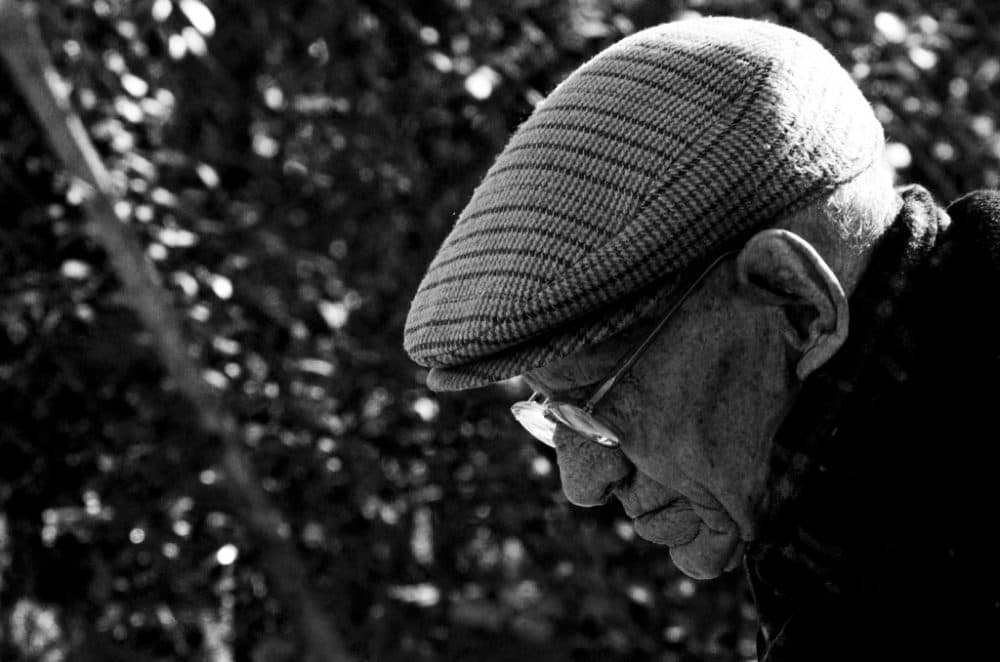Advertisement
Delirious: Study Finds Simple, Humane Fixes For Aged, Disoriented Patients

By Alison Bruzek
Guest Contributor
The patient was an older man, living at a nursing facility. He’d originally been admitted to the hospital for surgery to treat a urinary tract infection. But now, lying in his bed at the hospital after the operation, he was convinced that two people were standing outside his room and planning to blow it up.
“We could tell this person was delirious,” says Dr. Eyal Kimchi, a neurologist at Massachusetts General Hospital
Delirium is a complicated syndrome, most common among the hospitalized elderly where it’s estimated 29 to 64 percent of patients have it. However, it’s underreported and researchers estimate as many as two-thirds of cases go undiagnosed.
While usually temporary, it leaves people feeling severely confused. Their brains switch rapidly between mental states, increasing their risk of falling and later brain problems like dementia.
Though the patient’s mind was muddled, the idea of an explosion hadn’t appeared to him out of the blue — he was at the hospital around the time of the Boston Marathon bombing. What had likely happened, says Kimchi, is the patient had begun misattributing the news reports he saw playing on the television to actual life.
And even though that patient fully recovered, some of those delirious thoughts remained. “Ultimately this person said, ‘I know I’m better, I know I was confused, but I also know they were trying to blow up the place,’ ” says Kimchi.
People with delirium can often run the gamut of states, from hyperactive and aggressive to withdrawn and nearly comatose. The causes are not well understood but it’s a combination of a person’s predisposition to delirium as well as an event that sets it off, says Kimchi. These could be “surgery, infections, other sorts of brain injuries like trauma,” he says. “It’s still very hard to predict on an individual basis.”
While there’s not a lot of research on the predictors of delirium, there are ways to prevent it, according to a study released this week in the Journal of the American Medical Association Internal Medicine.
Prevention may be as simple as reminders and attentive care, says, Dr. Tammy Hshieh, a researcher of aging and geriatrics at Brigham and Women’s Hospital and author of the JAMA study. She suggests preventative measures like reorienting patients to where they are, keeping them hydrated and healthy, and ensuring they have hearing aids or glasses or other physical assistance is an effective method to stop delirium.
Hospital staff in delirium prevention programs are trained to help patients get up and get moving soon after surgery, rather than staying bedridden. They also provide companionship and assistance when patients eat meals and even set up ideal sleeping conditions with light music, dim lights and even massages. It sounds like the sort of service anyone might want at the hospital — not just the delirious.
Hshieh’s findings come from a review of 14 studies including nearly 4,300 patients around the age of 80 between 1999 and 2013.
One widely known preventative strategy is the Hospital Elder Life Program, or HELP, which trains volunteers and hospital staff on how to work with elderly patients. One of the main activities in HELP is orientation.
Orientation is almost a common sense procedure for hospital staff, says Hshieh: “When they come see the patient, reminding them of what day it is, the date, which day of the week, what time of day [and] where they are.” They also try to help the patients keep a good sleep cycle, which means trying to keep from waking them up for checks in the middle of the night.
Hshieh and her team found that using preventative measures like HELP, patients’ odds of delirium were 54 percent lower than those not in the program. In addition, patients’ odds of falling were 62 percent lower. The researchers estimate the savings to Medicare from stopping the falls alone is $4.5 to $6.7 billion.
So why isn’t this program in more hospitals? “Nurses are already doing a lot for the patients,” says Kimchi.
There’s also “no clear way for getting something like this reimbursed so I think a lot of hospital administrators have some hesitation toward investing in the cost of this program upfront.”
Hshieh says: “A lot of the families ask us, ‘Is there a pill they can take? Is there something you can do to fix them?’ ” Being able to tell loved ones they can try certain measures like reminding delirious patients where they are and what they’ve been through is empowering for the families.
While the current favored drugs for delirium are controversial — antipsychotics or sedatives – more targeted solutions in addition to programs like HELP are in the works. Beth Israel Deaconess Medical Center is currently running a study looking at brain scans of patients with delirium to better understand where delirium comes from and how it changes the brain.
But helping delirious patients is more than just addressing a syndrome, it’s helping us treat patients better in hospitals, says Sharon Inouye, developer of the HELP program and director of the Aging Brain Center at Hebrew Senior Life.
“I think delirium...it’s a barometer of how well an older person is doing in the healthcare system,” she says. “When delirium develops it’s a sign that we’re not doing well by that patient.”
That’s why no matter what treatments may come, Inouye says she's a big supporter of TLC: “We need to re-attune to these really humanistic parts of care and not forget about how important they are.”
Alison Bruzek is a science writer in Boston.